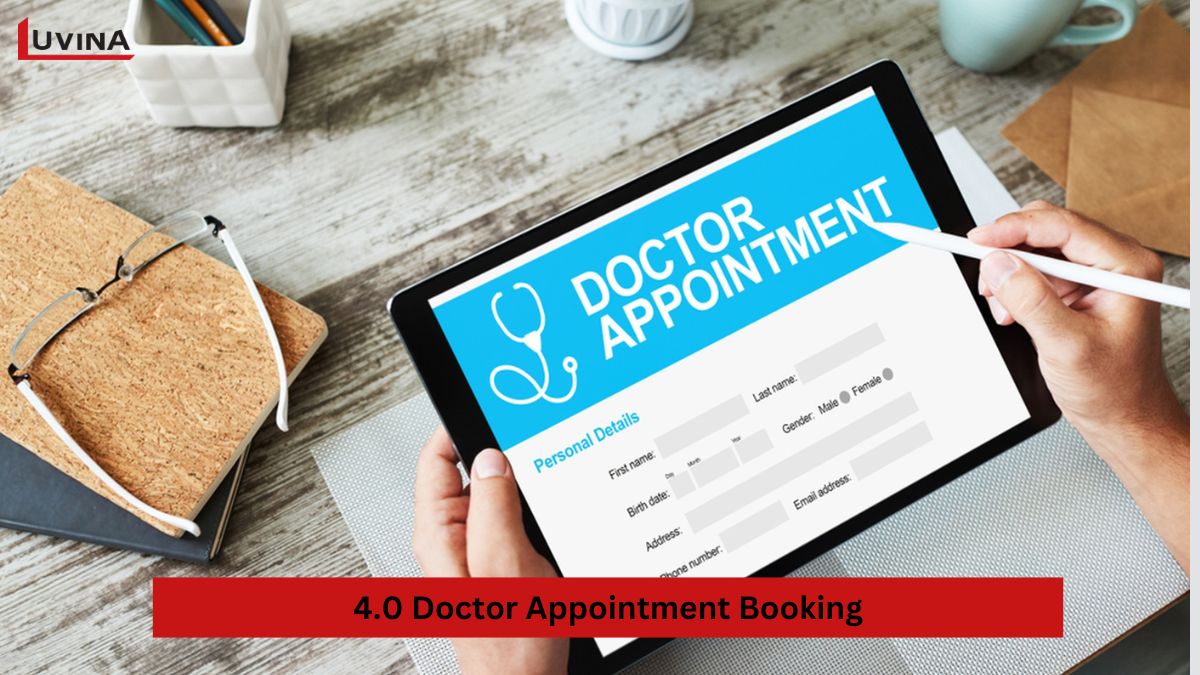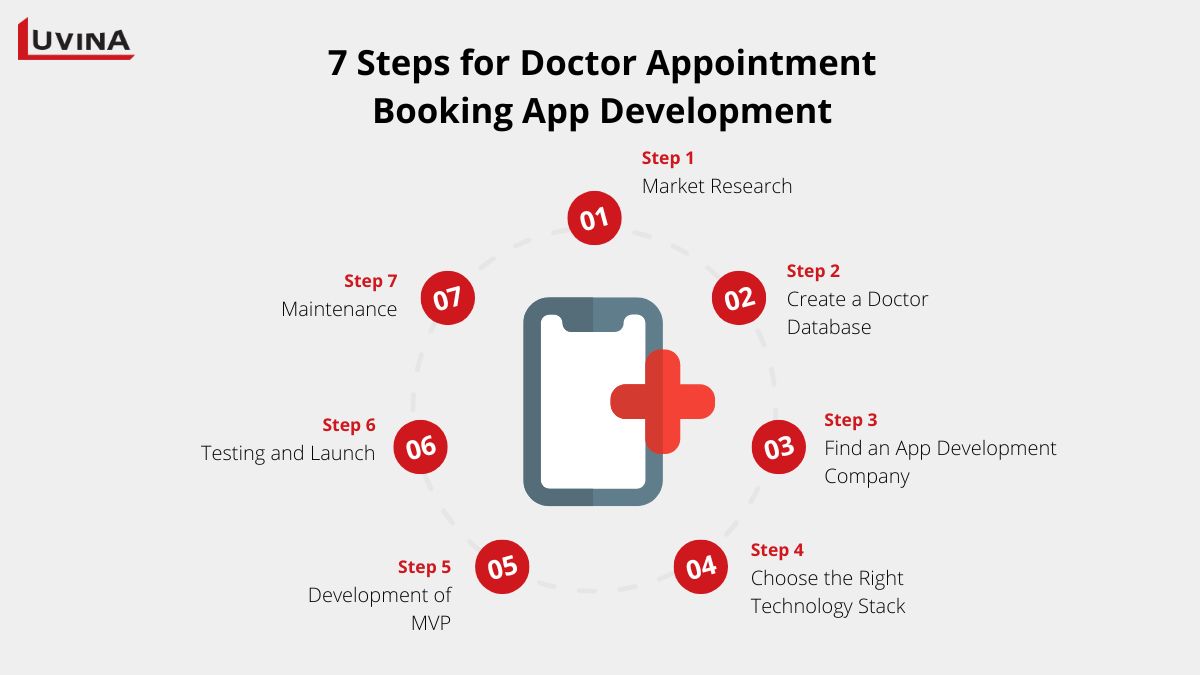The habit of doing everything on our phones has made doctor appointment app development a must-have trend in healthcare. Today, patients no longer have to sit in long lines or call hospitals to book an appointment. Instead, they can schedule their appointments from the comfort of their home.
According to research, the global market for doctor appointment booking is expected to reach $789.56 million by 2027, with an estimated growth rate of 13%. So why miss out on such a rapidly growing market? Read on to discover the purpose of a doctor appointment system and how to build one.
What is Doctor Appointment App Development?
Doctor appointment booking app development is the process of creating an application that simply involves designing an app that will make it easy for a patient, a doctor, or a hospital to create and manage an appointment. The services also include in-person visits, phone consultations, video calls, or instant messaging. Today, patients increasingly prefer health service providers who can prove to be digitally convenient by availing services such as remote monitoring, e-prescription, and electronic orders. Healthcare service providers who invest in developing digital services should gain more patients thereafter.

Personalized doctor appointment booking app development offers freedom and convenience to doctors, patients, and healthcare facilities, making them more open to technology and saving significant operational time.
Purpose of doctor appointment system
In the flow of technology, doctor appointment booking app development benefits all parties involved, including doctors, healthcare providers, and patients.
For doctors, the purpose of a doctor appointment system is to save time managing schedules and to expand their patient base. Additionally, using online appointment apps helps reduce missed appointments due to forgetfulness or inability to reschedule.
For healthcare providers, the features of a doctor appointment app enable more efficient operations. Scheduling appointments is a frequent task requiring attention, and automating schedule management reduces errors, minimizes appointment overlaps, and decreases administrative staff needs. This automation simplifies operations and lowers costs for healthcare providers.

For patients, especially those who are introverted or busy, using appointment scheduling services helps avoid numerous phone calls and saves time. Patients can book appointments without waiting, even while on the move, using just a smartphone with internet access. They can also cancel or reschedule appointments anytime, even late at night, without waiting for office hours. Additionally, appointment apps can integrate with calendars to notify patients of upcoming schedules.
Key Doctor Appointment App Features
To encourage patients to use the app, it must offer features that meet their needs. Below, we list some essential doctor appointment app features, along with additional features that healthcare providers might consider adding to optimize the experience for both patients and doctors:
| No. | Features | Functions |
| Key Doctor Appointment App Features | ||
| 1 | Patient Profile | This section allows patients to enter basic information such as name, age, gender, medical conditions, allergies (if any), and other relevant details. |
| 2 | Doctor Profile | Doctors create their profiles by entering basic information including name, age, gender, qualifications, available times, treatment costs, and appointment fees. This helps patients easily find and choose specialists. |
| 3 | Scheduling | This is the core feature of doctor appointment booking app development. Patients can book appointments with their preferred healthcare professionals based on their health issues. |
| 4 | Appointment List | This feature provides detailed information about appointments for both patients and doctors. It includes upcoming appointments, completed appointments, canceled appointments, and rescheduled appointments. |
| 5 | Support | A support team is available to ensure that the appointment booking service runs smoothly for patients. |
| 6 | Automatic Reminders | Sends notifications about upcoming appointments to both patients and doctors. For doctors, it helps manage schedules and reduce missed appointments, while for patients, it prevents them from forgetting or missing their appointments. |
| 7 | Push Notifications | A crucial feature that keeps patients and doctors updated with new information. Push notifications can include reminders, doctor availability status, missed appointments, and other relevant updates. |
| Nice-to-have Features | ||
| 8 | Reviews | Patients can provide feedback on their consultation experience with specific doctors. Healthcare providers can use these reviews to create a rating system for doctors, helping patients choose the right doctor and encouraging doctors to offer better services. |
| 9 | Telemedicine | This feature allows patients to schedule appointments for either in-person visits or phone consultations through the app, facilitating regular health monitoring. |
| 10 | Electronic Health Records (EHR) | Enables doctors to track patients’ medical history, make notes during consultations, and share information via the app. Patients can easily access their medical records and plan future appointments. |
| 11 | E-Prescriptions | Doctors can send electronic prescriptions to patients and suggest locations where patients can purchase prescribed medications. |
| 12 | Health Tips | Patients can use the app not only to schedule appointments but also to access useful health information and tips. |
| 13 | Maps and Navigation | Provides directions to physical clinic locations for patients. |
How to build Doctor Appointment Booking Apps Development from Scratch
There are several ways to develop a Doctor Appointment Booking Application. If you have sufficient IT resources, your company can either develop an in-house team for the development of an application or outsource the process. The following is a suggested process for doctor appointment booking app development:

Step 1 – Market Research
Identify the key features for your app. Start by studying existing apps, noting their business models and features. Pay particular attention to any inconveniences or bugs in other apps to avoid repeating these issues in your own app.
Step 2 – Create a Doctor Database
Allow patients to search for and select doctors based on specialty and availability. Without a database, patients won’t be able to find or contact doctors through the app. A detailed database will help doctors and patients in creating appointments within minutes and with much ease.
Step 3 – Find an App Development Company
Where your company is not ready to provide developers, you can outsource a custom healthcare development company. You can select companies that have already dealt with projects related to this and go through customer reviews to be assured whether they would meet your expectations or not. The company should have personnel or developers with roots in the healthcare sector for expertise on matters pertaining to app development, UX/UI design, and testing.
Step 4 – Choose the Right Technology Stack
Select the technology stack based on your app’s requirements, budget, and timeline. Some technology options for doctor appointment booking apps include:
- Programming Languages: Java, Kotlin
- Backend: Node.js, PHP
- Frameworks: React Native, Flutter
- UX/UI Design: User Interface and Experience Design
Step 5 – Development of MVP
MVP is the minimal form of an application that consists of core features. Developing an MVP allows you to test the app, identify issues early, and reduce development costs.
When developing the MVP, the design team will focus on creating the app’s UX/UI. They will choose a color palette, typography, and layout that is visually appealing and user-friendly. The design team must ensure that the entire app maintains a consistent design and is optimized for various screen sizes and orientations.
Step 6 – Testing and Launch
After completing the MVP, the quality assurance team will test the app across various devices and platforms to ensure it functions as expected. Testing includes functionality, usability, security, performance, and compliance with relevant regulations such as HIPAA. All the issues arising during testing will be modified by the development team before when the app is ready to go. After everything about testing and necessary adjustments has been made, the app will be sent to stores for download, such as the Apple Store or Google Play Store.
Step 7 – Maintenance
The application then goes into maintenance or improvement after its release. The development team fixes all the bugs that pop up during usage, renews features, and changes the design if need be. Regular updates and patches will be applied to keep the app functioning smoothly.
Luvina – Expertise in Healthcare online appointment booking development
By now, you likely have a clear understanding of how to develop a doctor appointment booking app. If you’re considering creating such an app, contact Luvina. With a deep understanding of the healthcare industry in the 4.0 era, Luvina will help clients achieve greater automation and efficiency while modernizing infrastructure, innovating products and services, and delivering better results at sustainable costs.

We have extensive experience in custom healthcare software development, ensuring data security, optimizing healthcare processes, and developing specialized services. Luvina currently offers various services in the healthcare field, including:
- Patient information management system: Building secure and professional internal systems for storing and managing patient data, simplifying tasks related to information management, health tracking, and payment processing.
- Medical supplies management: A system that ensures compliance, tracks equipment accurately, and controls costs.
- Home healthcare management: Coordinating and managing services for home-based healthcare, from workforce programming to patient information and care plans.
- Cost management for hospitals: Calculating healthcare service costs, and aggregating expenses from multiple sources.
- Independent health support services: Operating a management system that meets the highest standards.
Our team of over 750 developers is experienced in building applications for the healthcare sector and can guide your business through the process. Based on your requirements, our consultants will offer recommendations, timelines, and cost estimates for your project. Take the first step towards your future doctor appointment booking app development by reaching out to Luvina and consulting with our experts. We’re ready to create innovative solutions tailored to your business needs.
Related posts:









Read More From Us?
Sign up for our newsletter
Read More From Us?
Sign up for our newsletter